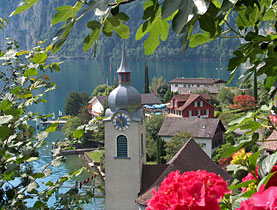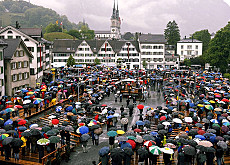When democracy is a burden

The hamlet of Bauen lies only a few miles from the Rütli meadow, the fabled birthplace of Swiss democracy, and yet it is having problems to govern itself.
The trouble is that not enough of its 180 inhabitants are willing to take on the task of sitting on the commune council and are prepared to take drastic measures to avoid being forced by law to do so.
Bauen, at the southern end of Lake Lucerne in central Switzerland, looks like an idyllic place to live. Thanks to its sheltered position, there’s hint of the Mediterranean about it, with palm trees in its gardens and the best figs north of the Alps.
Delightful as it is, three of its inhabitants have recently moved out. They were elected to the council against their will and one of them was even chosen to head it.
Like other small villages, Bauen has a problem in finding volunteers to take up public office. But the canton in which it sits, Uri, has a law that obliges people to accept such posts.
In December all three unwilling council members applied to be relieved of their offices. A commune assembly to take a decision on their request never took place.
Thereupon they all moved their legal residence to neighbouring villages and were therefore no longer available to be members of the Bauen council.
Ungovernable?
That leaves only two councillors, which means that the commune no longer has a functioning administration. The council has to have at least three members to be competent to take decisions.
If no volunteers can be found to replace the members who moved away, the canton is likely to take over the running of the village. The authorities in the cantonal capital, Altdorf, are not at all happy with the situation in Bauen, since the imposition of outside rule is not the ideal form of democracy.
“No decision about forced administration has yet been taken,” Emanuel Strub of the cantonal justice department told swissinfo, but he added that the item was on the agenda for the next session of the cantonal government.
If the canton takes over responsibility for the administration of Bauen, this would mean it would have to decide on such issues as granting building permits and guardianship matters.
Mergers could be a lifeline
Strub admits that even in larger communes it is becoming more and more difficult to find people willing to serve on the local council. That is why a number of communes are considering merging with their neighbours.
The people of Bauen have had the same idea: they are in favour of getting together with Seedorf, right next door. But while the people of Seedorf have agreed to think about the proposal, they have not yet reached a decision.
And since the Bauen council is currently not competent to take any decisions, it cannot conduct negotiations with its neighbour anyway – a vicious circle!
Strub explained that in general the geography of the canton means that it is hard for villages to link up. Uri consists of one long main valley, and many remote side valleys, so communities tend to be cut off from each other.
A council diploma?
The problem of finding people to take public office is not confined to canton Uri, which is why the Association of Swiss Communes is looking more generally for ways to tackle it.
One proposal is to set up a training course, which would grant students a nationally recognised diploma in commune administration.
The idea is not only to improve the skills of the local authorities, but also to make voluntary local government work more attractive.
But Strub is not convinced. “There are simply fewer people willing to make themselves available to exercise public office,” he says.
swissinfo, Etienne Strebel
The commune is the lowest administrative level in Switzerland, after the Confederation and the canton.
The size of communes varies considerably both in area and in population.
There is an ongoing trend towards amalgamation: in 2008 the number of communes dropped by 79 to 2,636.
Swiss citizens are expected to serve the community as part of the so-called militia system.
Since the 19th century this has included performing political duties within their communes.

In compliance with the JTI standards
More: SWI swissinfo.ch certified by the Journalism Trust Initiative




You can find an overview of ongoing debates with our journalists here . Please join us!
If you want to start a conversation about a topic raised in this article or want to report factual errors, email us at english@swissinfo.ch.